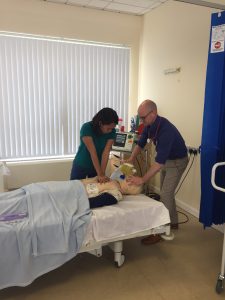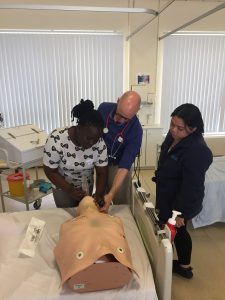27th June 2019

The HSC Clinical Education Centre (CEC) have traditionally used simulation as part of their teaching methodologies for the planning, design and delivery of in-service education for nurses, midwives and allied health professionals across the 5 HSC Trusts, including the private and voluntary sector. However, over the past 2 years the CEC have increased their offering of simulation-based programmes across each of the four CEC sites. Programmes that incorporate simulation-based education include, but are not limited to; The Deteriorating Patient: Assessment, Intervention and Management for the Adult, Community setting and the Child, and the International Nurse OSCE preparation programme. The format of these programmes cover the theory during the morning session, followed by a very much hands-on practical approach in the afternoon, using high fidelity mannequins and various pieces of equipment, where participants are faced with challenging patient scenarios to deal with. This is carried out in a supportive, safe, learning environment, to ensure participants gain confidence in their ability to recognise patient deterioration in a timely and appropriate manner.
A significant number of staff across each of the 5 HSC Trusts may have limited experience in dealing with deteriorating patients, due to being new into post or haven taken on a new role, therefore this programme is an excellent way in which to address this learning gap. With Future Nurse Future Midwife on the horizon, this programme is also very timely, as the role of the nurse will be expanding. Community and district nursing services have now moved to an ‘enhanced care at home’ model, in line with the strategic direction of healthcare in Northern Ireland, so the use of simulation-based education gives participants the experience they will need in a protected teaching environment, using scenarios based on real patient presentations from practice.
In order to enhance the knowledge, skills and abilities of CEC Nurse Education Consultants to deliver simulation-based education, there have been several opportunities provided to do so. A group of CEC staff attended the NISHFN autumn conference 2018, which was highly worthwhile, while another small group of staff attended the Maudsley-Simulation centre in London, which ran perinatal mental health simulations, showing the diversity of what can be offered through this teaching approach.
Simulation-based education is growing from strength to strength, right across the CEC and has been welcomed by staff and participants’ alike. Some recent participant feedback on the Deteriorating Patient programme included; “Today was comprehensive, coverage of all topics and had great interactive opportunities” another said “I would highly recommend this topic to all nurses, doctors and health care workers”. To date, simulation-based education in CEC has provided participants with an excellent opportunity to put principles of healthcare into practice, bridging the theory-practice gap. It is one of the key priority areas going forward for CEC and staff are excited to embrace and explore this area even further into the future, in order to support the learning journey of all nurses, midwives and allied health professionals working across the HSC.
 Business Services Organisation
Business Services Organisation



